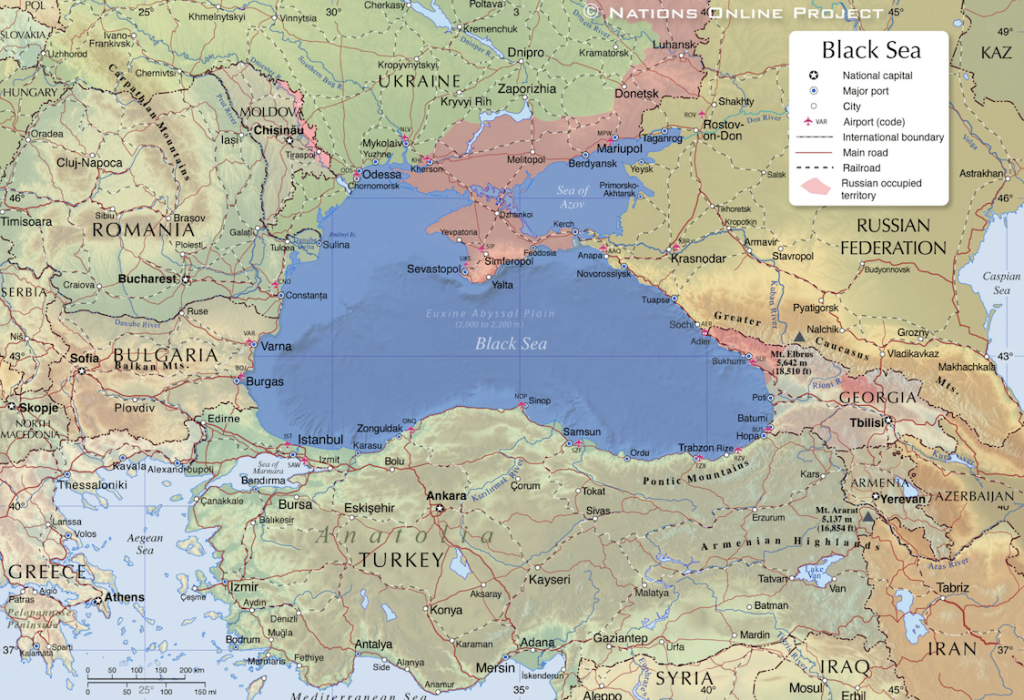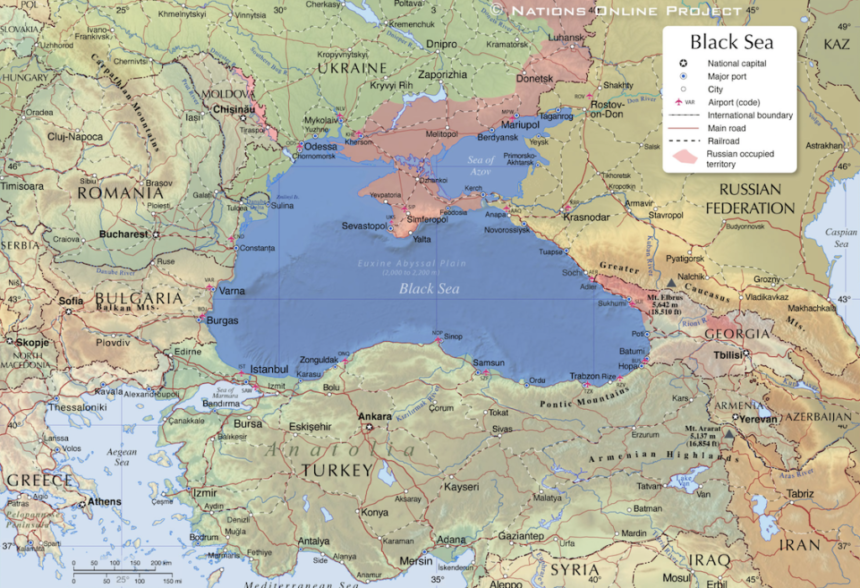In the New Cold War, elections around the world are now viewed in the West as existential battles between good and evil, between the West’s “freedom” and the “authoritarianism” of Moscow and Beijing.
So it was in Georgia, the small Caucasus country that held parliamentary elections yesterday.
Ahead of the vote the US and EU threatened to slam the door on the country’s westward path and impose sanctions, they shrieked about free and fair elections, and their spooks came out of the woodwork to encourage Georgia to choose the West. One of my favorites was a piece from Gary Schmitt, a resident scholar in strategic studies and American institutions at the American Enterprise Institute, and Reuel Marc Gerecht, a former Iranian-targets officer in the CIA’s Directorate of Operations who is now a resident scholar at the Foundation for Defense of Democracies. They wrote a hyperventilating piece titled “Losing Georgia to Putin” that included the following:
Like the Baltic republics, a democratic Georgia that freely rejects Moscow’s dominion serves as an icon for how a formerly Soviet people can become more humane and prosperous. Stunningly beautiful and wine-rich, stubbornly Christian but religiously tolerant, and sandwiched between Turkey, Russia, Azerbaijan, and the Black Sea, Georgia has historically had an outsized influence on the region.
Yes, Georgia has wine exports (which happen to rely on the Russian market). It also counts Armenia as a neighbor, a curious omission seeing as the US and its vassals in the EU are increasingly present there but would be effectively cut off by a pro-Moscow Georgia.

There were five main parties competing in the election, and all but Georgia Dream favored a Western path for the country. Georgia Dream is currently winning handily. With 99.646% of ballots counted, the ruling Georgian Dream is winning with 54.2%. The other pro-West parties totals:
- Coalition for Change – 10.8%
- Unity – National Movement – 10%
- Strong Georgia – 8.8%
- Gakharia – For Georgia – 3%
Predictably, the opposition is refusing to accept the results and are calling for demonstrations. We’ll have to wait and see how far that takes them.
🇬🇪 The Georgian opposition announces mass protests.
The date, time, and location will be determined after coalition negotiations and the closing of all polling stations. President Salome Zourabichvili has stated that attempts are being made to falsify the elections in the…— CaucasusWatch (@Caucasus_Watch) October 26, 2024
The fear mongering over a Georgia Dream-led end to democracy has been amped up for months now ever since it passed a foreign agents law in the spring. That law requires NGOs and media outlets that receive more than 20 percent of their funding from abroad to register as such with the government.
Since the 1990s, Western NGOs have played a huge role in Georgia, often filling the space that state capacity would, and it gave the Americans and Europeans sway over the country. The reporting requirement for foreign-funded groups makes it harder for US- and EU-backed organizations to affect votes or inconspicuously cook up color revolution attempts. In the runup to the vote, searches conducted by the Ministry’s Investigation Service related to “fraudulent call centers” and money laundering included two employees of the American think-tank Atlantic Council and an American outsourcing company Concentrix.
In the spring tens of thousands of Georgians protested in Tbilisi against the law—the first big step toward dictatorship they claimed. The party overruled a veto from the largely ceremonial president to pass the law. Since then, she has helped lead the charge against the ruling government:
I present the “Georgian Charter” action plan!
To rebuild trust, we need a new political reality: a distinct unity, different elections, a different parliament, and a different government! #GeorgianCharter
🔗https://t.co/9GplSRhb5U pic.twitter.com/XJ5I0NboDU
— Salome Zourabichvili (@Zourabichvili_S) May 27, 2024
A quick note about that president, the Paris-born Salome Zourabichvili. She enjoyed a thirty-year career in French spookish positions, including as second adviser to the French Embassy in Chad during the Paris-backed coup led by Idriss Déby. She was also director of International and Strategic Affairs at the General Secretariat of National Defense and worked with the Bureau of Strategic Affairs of NATO. From 2003 to 2004 she was French ambassador to Georgia and then moved seamlessly into the spot of Georgian Minister of Foreign Affairs after being appointed by former President Mikhail Saakashvili, the guy who led Georgia into a disastrous 2008 war against Russia. Zourabichvili has been involved in Georgian politics ever since.
Zourabichvili stated ahead of the vote that she rules out any outcome from the elections other than the victory of pro-European forces. The US and EU have been issuing threats to Georgia ever since the foreign agents law passed in the spring.
The West doesn’t have much to offer aside from EU membership. Brussels gave Georgia “candidate status” in December 2023 but that was effectively put on hold after the foreign agents law passed. EU officials will, however, likely slap sanctions on the Georgian Dream leaders — as will the US.
More measures were working their way through the US Congress with the threat of passage looming over yesterday’s vote.
War criminal Putin should not be allowed to shape future of Georgia says @RepJoeWilson the author of MEGOBARI act in US Congress pic.twitter.com/FnveOENCra
— Formula NEWS | English (@FormulaGe) July 12, 2024
Over the summer the Biden administration imposed visa restrictions against dozens of Georgian officials, suspended $95 million in aid to Georgia, and let it be known that it had prepared a package of sanctions just in case.
This bill is a declaration of war against Georgia. https://t.co/7WeT6OkObd
— Sopo Japaridze (@sopjap) May 25, 2024
On October 23 U.S. National Security Advisor Jake Sullivan regurgitated the usual talking points about free and fair elections, but with the US and EU stick-heavy approach it’s fair to wonder just how free the vote was, and yet Georgia Dream still won going away.
Georgia Dream
While Georgia Dream might be the target of Western strong arming, it’s also no group of saints.
Some observers believed that the party might have overstepped with promises to ban most of the opposition should it win a constitutional majority and it would be hurt at the polls. The party’s stated justifications for such a ban include allegations that the opposition wants to use Georgia “open the second front” against Russia, as well as its assault on “family values” through “pseudo-liberal ideology” like the legalization of sex-change surgery, the legalization of other so-called genders beyond female and male.
Bidzina Ivanishvili, one of the richest men in Georgia, bankrolls the party and acts as one of its figureheads and its chief loose cannon. He has continued to talk about political bans while referring to parts of the opposition as Nazis, a tumor that must be cut out, and a plague.
Segments of the opposition, according to Ivanishvili, are part of the “global party of war” who want to use Georgia against Russia. That would hardly be surprising, but Ivanishvili and company have been making this claim for some time, although the evidence is yet to be unveiled.
Georgia Dream wasn’t always at odds with the West. Like the US and EU, it follows neoliberal ideology, and it had largely followed the EU-NATO path since coming to power in 2012 — and even today party members say they would like to pursue EU membership and NATO cooperation but on their own sovereign terms.
The party took steps to increase Gerogia’s sovereignty in recent years, however. In 2021, it ended the U.S. training program for Georgia’s military. And the big one came earlier this year with the aforementioned foreign agents law.
Ukraine helped change the calculus. Party members speak frequently about how NATO membership has been dangled in front of Ukraine, and the entire debacle for Kiev has also made pursuit of membership in Western blocs less attractive.
Viewed in this light, it’s unsurprising that Georgia Dream performed so well in yesterday’s election. Like most voters everywhere, Georgians just want peace and a decent paycheck. Here’s a report from RFA/RL in early October acknowledging that fact while admitting that the opposition hardly campaigned outside a few urban areas. The US loves itself a lesser of two evils election, but that type of proposition increasingly favors the East in the New Cold War.
The fact that the EU economy is struggling while Russia’s is on the upswing means Georgians are reckoning with long held beliefs that the EU and West in general is the key to unlocking a better future. At the same time, the opposition to everything Russian comes across as heavy handed. A fair amount of Georgians have fond memories of the economic stability of the Soviet era. Nowadays that’s branded as Russian disinfo by the pro-west crowd.
Russia is one of the country’s top trading partners and turnover has been steadily increasing.

Georgia’s trade with Russia, China, and regional partners dwarfs the economic ties with the EU and US. At the same time, the war in Ukraine makes Georgia a more attractive transit country. And that means alarm bells are likely going off in situation rooms in DC right now.
Georgia and the US Black Sea Strategy
Assistant Secretary of State for European and Eurasian Affairs James O’Brien made clear in a July Subcommittee on Europe and Regional Security Cooperation hearing what the US’ real problems with Georgia are:
Two things. One is it should be clear to the governing party in Georgia that there is a path back, that having free and fair elections without violence against civil society, making whatever transparency requirements they want. This Foreign Agent Law, make it compatible with EU law rather than compatible with Russian law, and not have China develop a deep water port in Anaklia. These are steps that are really important for Georgia to take.
Here seems like a good point to note that the US has its own Foreign Agents Registration Act, and that Georgia’s law does not mean that these NGOs cannot operate; they just must register. But Washington wants to be able funnel unlimited amounts of dark money into the country to steer its politics.
There is a little more detail to O’Brien’s second point on the Chinese port. The US, of course, is not offering to build a port in China’s place. O’Brien does not mention that the state-backed Chinese consortium selected to build Georgia’s deep sea port submitted the sole bid. There was a past effort to build it that involved the US, but that didn’t go well. Here’s some background from RFE/RL:
A previous attempt to build the port in Anaklia by a consortium formed between Georgia’s TBC Bank and U.S.-based Conti International was canceled by the government in 2020 after years of political controversy that saw TBC co-founders Mamuka Khazaradze and Badri Japaridze facing money-laundering charges.
Following the charges, the American investor pulled out and the project ground to a halt until the government canceled the $2.5 billion port contract.
Georgia already has Black Sea ports in close proximity to Ochamchire which are currently serving as connecting links between Europe and wider areas of Central Asia, which includes a range of countries stretching from the South Caucasus to China’s western Xinjiang region. While it’s unlikely the Middle Corridor becomes a major route connecting China and Europe due to significant geographic, political, economic issues that make it difficult to match other maritime or land-based transportation options, it’s still a big deal for Georgia and the countries of Central Asia and the South Caucasus. As of now Georgia is the only route to the Black Sea that makes sense — unless progress is made on the Zangezur Corridor through southern Armenia.
While Chinese influence in Georgia might take a hit due to yesterday’s election, its influence in the Caucasus is growing. Azerbaijan is strategically the most important country in the region due its fossil fuel wealth. Baku and Beijing signed a Joint Declaration on establishing a strategic partnership at this year’s Shanghai Cooperation Organization summit. The economic components of that agreement focused on cooperation in oil and gas production and transport infrastructure — i.e., continuing their pursuit of connectivity through the Middle Corridor, also known as the Trans-Caspian International Trade Route. It could also mean more competition for dwindling EU energy suppliers.

The Chinese are also working on major highway projects in Georgia. Sometimes it seems the US doesn’t want to see anything built at all. It does, however, want to control. In this case that means the current rickety routes connecting central Asia and its vast resources of energy, metals, coal, and cotton to Europe and subsea power cables connecting South Caucasus energy to the EU. What gives the US an advantage — if we want to call it that — is that by operating so far from home it can play recklessly. While there are US business interests in the region and Washington would prefer to control more, it’s more damaging for Russia and China if a country there goes up in flames. That’s probably why we’re seeing Russia branch out and assist in the degradation of Western “assets” in Africa and the Middle East, but that’s a story for another day.
The US strategy is similar to hostage taking. It would like to control but the fallback option if its demands aren’t met is destruction. The 2008 Georgia-Russia war was a disaster for Georgia, but it did achieve US goals of poisoning ties between the two countries for more than a decade until Georgia Dream recently sought to repair them. We’ll now likely see how much chaos the western-backed NGOs can organize in the country or if the foreign agents law passed earlier this year had its desired effect.
The US is also opposed to the Russian military base plans in Abkhazia, but there’s little Georgia can do there as Russia recognized Abkhazia as independent and stationed troops there following the war. Russia is also helping with the reconstruction of the Abkhaz railway system, which could enhance Moscow’s connections to the Middle East and help to solidify Caucasus corridors that bypass Western-controlled routes — but that now looks unlikely in the immediate future with yesterday’s results.
Construction of a permanent Russian naval base in Ochamchire, Abkhazia, is also underway roughly 18 miles (30km) from the planned Chinese-operated deep-sea port in Anaklia.
The US National Security Council (NSC) is currently working to formalize a Black Sea security and development strategy across government agencies, but the current National Defense Authorization Act already outlines several pillars of that strategy that can effectively be boiled down to “keep Russia and China out and the US and NATO in.”
What that envisions is an arc of “rules-based order” states from the Caspian to the Adriatic that would allow the US to exercise control over the movement of energy and goods through the region, and especially in the South Caucasus, which is positioned at the intersection of burgeoning East-West and North-South transport corridors. It’s one part of the US bid for global dominance, which seeks to control key maritime corridors and choke points. Russia, China, and others are naturally seeking to utilize other routes or develop them as backup options in the case of isolations directed against them. And the US is trying to close those down by whatever means necessary.
As Assistant Secretary of State for European and Eurasian Affairs James O’Brien put it before the recent Senate Foreign Relations Committee subcommittee hearing “The Future of Europe”:
(We are) are working to foster deeper cooperation among the Black Sea states. But there remain challenges to democracy in some quarters, where backsliding is a significant concern. We must maintain our focus on countries like Georgia, working with like minded partners to promote measures that strengthen democracy and incentivize a return by these governments to a Euro-Atlantic path. In Russia’s periphery, we seek to help those countries that have struggled between the pull of EU accession and the pressure of Russia’s autocracy, and work with those leaders to get them out of the ‘grey zone’ and into western-style democracies. We are building a path for countries in the Western Balkans, Moldova, and the Caucasus independent of malign influence from the PRC and Russia. Some elites in that periphery are bucking against making the hard reforms needed to join the EU and NATO. We must work together to ensure those reforms are done.
That strategy just took another big hit.





